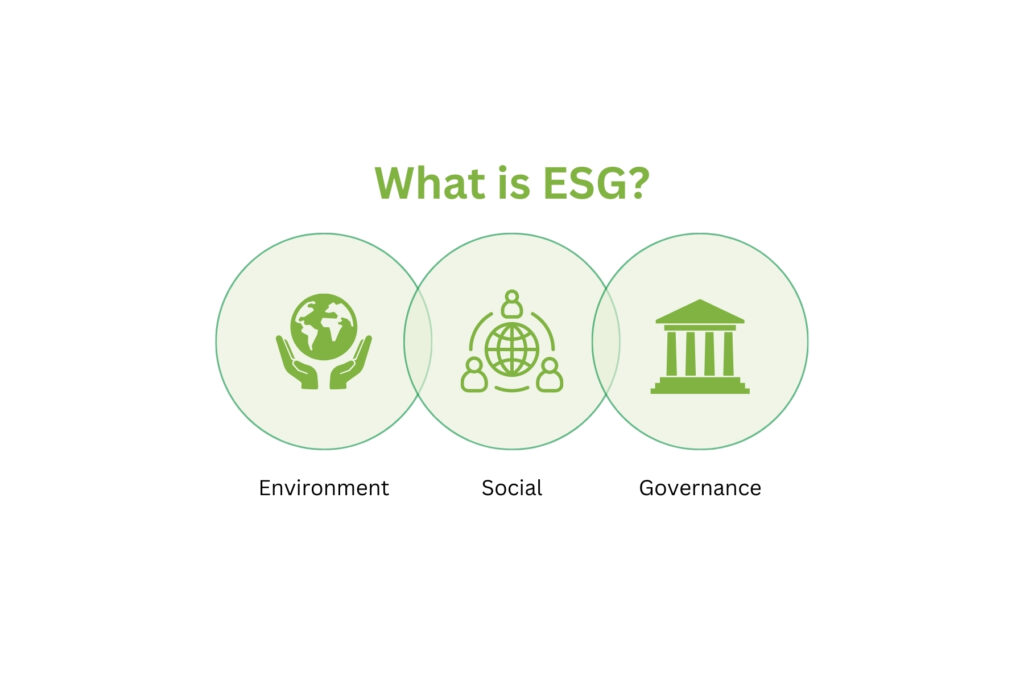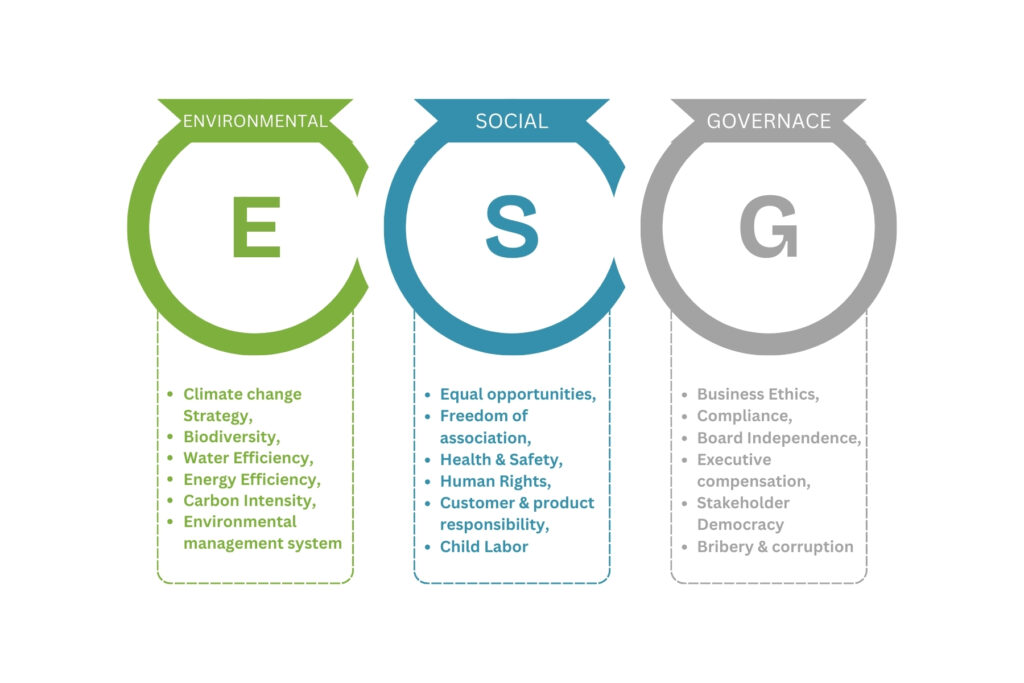What is Environmental, Social, and Governance (ESG) Framework?
Environmental, Social, and Governance (ESG) management Framework is a pivotal tool that offers a comprehensive evaluation of a company’s performance in environmental, social, and governance areas. ESG Framework serves as a holistic lens to assess a company’s impact on the environment, its commitment to social responsibility, and the effectiveness of its governance structure.

The Environmental, Social, and Governance goals of ESG is to capture all the non-financial risks and opportunities inherent to a company’s day to day activities.Environmental, Social, and Governance goals involve a commitment to continuous improvement, transparency, and responsible business practices. It’s about creating a positive impact on the environment, society, and governance while aligning with the organization’s overall mission and vision.
Categories of ESG Framework

Environmental Social and Governance management (ESG) Framework is a set of guidelines that help investors identify and assess the environmental, social, and governance (ESG) risks and opportunities.
Environmental: Encompassing issues like air quality, water pollution, climate change, and more.
Social: Covering areas such as employee rights, workplace safety, labor practices, and community involvement.
Governance: Including transparency, board composition, compliance, and ethical policies.
ESG Framework Have Five Core Pillars
- Environmental Social and Governance (ESG) Framework Integration
- Environmental Social and Governance (ESG) Framework Metrics
- Environmental Social and Governance (ESG) Framework Issues and Opportunities Assessment
- Environmental Social and Governance (ESG) Framework Integration into Investment Processes
- Reporting on Environmental Social and Governance (ESG) Framework Activities
By implementing the Environmental Social and Governance (ESG) Framework, companies are able to:
- Gain insight into how they are performing in specific areas related to Environmental Social and Governance (ESG) Framework.
- Understand how to better manage those aspects of their business that impact the environment, society, and governance of their organization.
- Leverage data and information about their own performance so that they can make more informed decisions about where they want to go next.
Environmental, Social and Governance (ESG) Strategy
In today’s global arena, setting an Environmental Social and Governance (ESG) Strategy is seen as an important benchmark for how responsible organizations operate. A successful Environmental Social and Governance Strategy covers the three main pillars of sustainability: Environment; Social; and Governance. The purpose of an ESG Strategy is to demonstrate the environmental, social, and governance factors that your organization believes to be intrinsically important to consider within your current and future business operations.
If you do not currently have an ESG strategy, 999 waste management services can help you to develop a bespoke strategy that reflects your sustainability vision.
Environmental Social Governance Solutions
Environmental Social Governance Solutions focus on integrating Environmental Social, and Governance factors into business practices for sustainable and responsible operations. These solutions encompass a range of strategies, including:
- Environmental Practices: Implementing eco-friendly initiatives, reducing carbon footprint, and optimizing resource usage.
- Social Responsibility: Addressing social issues, promoting diversity and inclusion, and ensuring fair labor practices.
- Governance Standards: Enhancing corporate governance, transparency, and ethical decision-making within the organization.
- Risk Management: Identifying and managing non-financial risks associated with ESG factors to protect long-term value.
- Stakeholder Engagement: Actively involving and communicating with stakeholders to understand expectations and concerns.
- Data Transparency: Providing accurate and transparent reporting of non-financial performance to stakeholders.
- Long-Term Planning: Developing sustainable strategies and goals aligned with the organization’s mission and vision.
Environmental Social Governance Solutions help businesses navigate the evolving landscape of environmental and social responsibility while maintaining strong governance practices.
What are the benefits of ESG?
Adopting a proactive ESG strategy that is aligned with your corporate objectives demonstrates to your consumers that sustainability, of all aspects, is important to your organization. A well-developed ESG strategy can provide you with a competitive advantage by meeting pre-tender and contractual requirements while highlighting a responsible approach to climate change, stakeholder wellbeing and governance requirements.
A strong ESG strategy also correlates with an increase in cost savings through improved process efficiencies to combat rising operating costs. Better business performance demonstrated through a strong ESG strategy also corresponds with a reduction in risk, through the development of stronger risk identification and management processes, enabling your organization to drive informed and effective planning practices. An ESG strategy can also align your organization with the requirements for ISO 14001 and ISO 50001, providing an opportunity to gain external validation from an independent body for the organization.
With improved risk management processes in place, a strong ESG strategy can relieve the regulatory pressure on organizations, enabling organizations to plan for, and action, future legislative requirements. An effective ESG strategy will enable your organization to develop a strong foundation for establishing compliant policies and procedures that meet mandatory reporting and legislative requirements
999 Waste Management Services provides comprehensive assistance to organizations in crafting tailored ESG strategies. Their services encompass strategy development, assessment and enhancement of existing strategies, implementation of sustainability plans, and establishment of long-term objectives.
The team identifies organizational risks, verifies data for stakeholders, offers ESG training to staff, and provides guidance on ISO Management Systems and mandatory reporting. With expertise in developing ESG strategies, 999 Waste Management Services ensures alignment with broader objectives and delivers sustainable improvements tailored to each organization’s unique needs.
